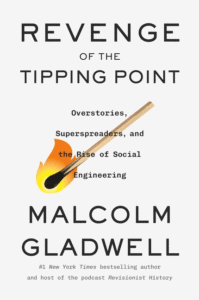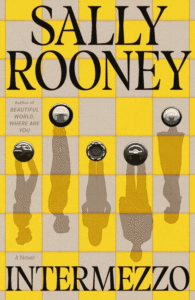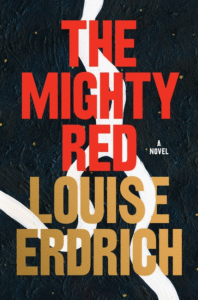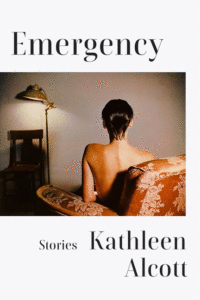5 Book Reviews You Need to Read This Week
“This maximalist approach to storytelling relies on astounding powers of memory and invention.”
Our quintet of quality reviews this week includes Anahid Nersessian on Fady Joudah’s […], Anand Giridharadas on Malcolm Gladwell’s Revenge of the Tipping Point, Jessi Jezewska Stevens on Sally Rooney’s Intermezzo, Leigh Haber on Louise Erdrich’s The Mighty Red, and Hannah Gold on Kathleen Alcott’s Emergency.
Brought to you by Book Marks, Lit Hub’s home for book reviews.
*
“Joudah belongs to a poetic tradition for which the unpronounceable mark—the ellipsis, the bracket, a large space on the page—has an intimate relationship to historical violence. It’s a tradition that includes Paul Celan (born Paul Antschel), a Holocaust survivor whose prolific ellipses, em dashes, and colons suggest the incommunicability of severe collective trauma, and M. NourbeSe Philip, whose 2008 masterpiece Zong! repurposes the text of an eighteenth-century legal case involving the murder of over 130 captive Africans, creating a fragmented work whose large white spaces signify the gaps and silences in the official record. These typographic gestures draw attention to what poetry can and cannot do, and to its always abortive attempts to make sense of what is beyond moral comprehension…
The poems in […], while occasioned by death, are poems that insist upon life … Throughout […], Joudah puts severe pressure on the addressee of his poems. Apostrophe, the rhetorical figure by which a speaker hails someone or something who cannot (for various reasons) reply, becomes a device for mapping the contours of both hatred and the resistance to hatred … If anyone wanted to wonder what such sensual lines are doing in a book whose occasion is bloodshed and unremitting horror, the only answer would be that […] is a book that forces life to disrupt annihilation. In the name of thousands dead and gone it declares, ‘Our bodies are real,’ a phrase Joudah pairs with the equally inarguable ‘Our ghosts are here.’ He persistently asserts the tangible against the unspeakable, that which can be remembered against that which has been obliterated.”
–Anahid Nersessian on Fady Joudah’s […] (New York Review of Books)

“Malcolm Gladwell could have written a fresh book. Instead, he created a brand extension … A genre bender: self-help without the practical advice, storytelling without the literariness, nonfiction without the vital truths, entertainment without the pleasure, a thriller without actual revelation and a business book without the actionable insights. But it will be big! For Gladwell’s books belong to that special category where books are not books so much as advertisements. Revenge of the Tipping Point might get you to sign up for Gladwell’s MasterClass course on storytelling. It might lead you to Pushkin Industries, the podcast company he helped start. Or it could inspire a business to hire him to give the new talk his speaking agency is already marketing on ‘how not to miss the forest for the trees’…
He has chosen to be a farm stand that serves salty, fatty, sugary pseudo-thinking. His signature methodology is to convey relatively boilerplate, already well-known ideas, by rebranding the ideas and wrapping them in stories. And the lubricant of this engine is turning everything into little mysteries—why bank robberies spread in Los Angeles in the 1990s, but not in New York in the 1950s—that he, having created them, can now solve for you. Some may find the faux-thriller construction annoying, but I believe it is necessary as a subsidy to, and concealer of, weak-sauce ideas.”
–Anand Giridharadas on Malcolm Gladwell’s Revenge of the Tipping Point: Overstories, Superspreaders, and the Rise of Social Engineering (The New York Times Book Review)
“…there was something remarkably liquid, something ‘unshaped,’ about Rooney’s early protagonists, who, despite different class and gender markers, tended to share similar worldviews. Her latest, by contrast, presents a far more realized and varied cast. The effect serves to reframe prior critical debates, bringing to mind literary scholar Sianne Ngai’s arguments about the perils of shoehorning the novel-of-ideas into a realist skin. The solution of embodying ideas in characters, Ngai notes, ‘cannot do much when characters are as abstract as the ideas they personify.’ The other solution, which is to stage conversations about ideas between characters, can be equally fraught. Could it be that Rooney’s harshest critics took umbrage not with her characters’ anxious politics, per se, but with the way Rooney, now thirty-three, previously split the difference between the novel-of-ideas and the realist romance? If so, Intermezzo is poised to convert initial skeptics.
Hovering over the book are the language-games of Wittgenstein … Intermezzo’s characters are sturdy enough to embody these Platonic paradoxes, their real-life situations complex enough to evade them … I have my quibbles with Rooney’s style. I often crave an outburst, a Brontë-like rupture in the cool self-control that extends like a frost throughout her novels, governing characters and sentences alike. I wonder, too, if the proliferation of binaries taxes the novel’s focus. Still, I cannot help but admire Rooney the storyteller, willing to toe that tricky line between the pleasure-read and philosophy, determined to choose cooperation over cynicism. If the millennial mind is overwrought, exhausted, and losing its edge, Intermezzo suggests, have mercy.”
–Jessi Jezewska Stevens on Sally Rooney’s Intermezzo (4Columns)
“Erdrich is at her best—as she is here—when she draws on her deep connection with the Great Plains and its Indigenous people … In The Mighty Red, Louise Erdrich’s enthralling ode and elegy to the people of North Dakota’s Red River Valley, climate change, Big Ag and economic hard times have ravaged the landscape in and around the small town of Tabor during the late aughts. Many of its inhabitants are descendants of the Ojibwe, Dakota and Métis tribes, whose acreage was lost to them in a series of cession treaties over the centuries; they now scramble to make a living, toiling for others on land that was once theirs …
This backdrop could make for a mournful tale of intergenerational trauma and displacement, but Erdrich has other plans for her characters, whom she imbues with the grit and optimism to rise above their challenging circumstances … There is an amiable, inviting quality to all of Erdrich’s 19 novels that in part explains how it is possible to be hugely entertained while learning why farmers require increasingly powerful pesticides or what our collective sweet tooth is costing the planet. That accessibility, though, in no way diminishes Erdrich’s unparalleled ability to conjure a scene or a character, or to portray the natural world with awe … Erdrich calls on us to heal our frayed bond with the earth, and to regard it, as she does, with wonder.”
–Leigh Haber on Louise Erdrich’s The Mighty Red (The Los Angeles Times)
“Alcott’s sentences, too, strain to hold as much evidence as they can, and often succeed. This maximalist approach to storytelling relies on astounding powers of memory and invention. In Alcott’s work the record will not be sweetened or sanded down. Instead it is reconstituted and reimagined until the urgency of the past comes into full view … With their first collection of short stories, Emergency, Alcott has arrived somewhere new. Many of the stories focus on women in their mid-thirties from poor backgrounds who have recently gone through breakups with wealthier men. Many have lost a parent or are distant from their families. As young adulthood definitively comes to an end, some of these women confront the appalling realization that in the eyes of the world, and even many of their intimates, they have been objects, prizes, predictable types. The collection is Alcott’s most accomplished work to date …
Alcott doesn’t hold back either when drawing the reader into the protagonists’ psychic torments, their splashiest ambiguities. With precision and grace Alcott animates the tension between the characters’ need to let the past make extravagant claims on them and their need to protect themselves from the danger those claims pose. Their moods suddenly darken, and departed loved ones enter their thoughts as if no time had passed. They reclaim their freedom as solitude, but regret keeps them company.”
–Hannah Gold on Kathleen Alcott’s Emergency (New York Review of Books)



![Joudah, Fady_[...]: Poems Cover](https://s26162.pcdn.co/wp-content/uploads/sites/2/2024/04/15e42cfe676ecab84d37dba134c4d694-212x300.gif)





















